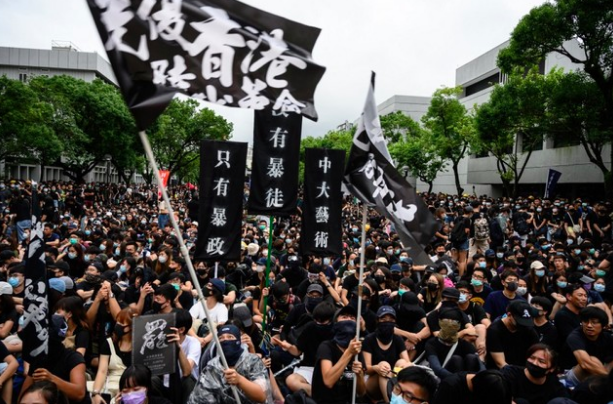By Connor Mirabella || Contributing Writer

Photo courtesy of Philip Fong/AFP.
The Chief Executive of Hong Kong, Carrie Lam, fully withdrew the controversial bill that allowed extradition of Hong Kong residents to mainland China on September 4th. The decision came after nearly 13 weeks of tumultuous and disruptive protests in Hong Kong. The region has been rife with tension since the bill was initially proposed. It would allow criminals charged in Hong Kong to be extradited to mainland China and thereby subjected to the Chinese justice system, as opposed to the judicial system that Hong Kong has in place. Hong Kong has long valued its autonomy, especially in comparison to mainland China, which has an authoritarian government and less judicial process. Hong Kong is set up as a democracy and its residents place a high value in maintaining their democratic governance.
Earlier this year, the Hong Kong Special Administrative Region Government considered passing a bill that would include The Fugitive Offenders Ordinance allowing extradition to China – thereby allowing the Chinese legislative system supersede Hong Kong’s criminal courts. Hong Kong has similar arrangements with over 20 countries including the United States but it has never had an extradition agreement with mainland China or Taiwan. This bill was initially proposed following the murder of a Hong Kong resident while on vacation in Taiwan. The murder was committed by another Hong Kong resident who had been traveling with the victim. The bill was then supported by the government agencies in Hong Kong which sparked protests that have reached far beyond the scope of the initial extradition bill. This has become a battleground for Hong Kong’s democracy and their sovereignty.
Carrie Lam initially suspended the bill indefinitely as protests arose, particularly in Hong Kong’s international airport. According to CNN, this is not only one of the world’s largest airports but also a key point of disruption for protestors. Protestors have consistently delayed and prevented departing flights from leaving thereby threatening the business interests of international organizations and mainland China.
There is more to these protests than just the extradition bill, however. Police have been accused of using excessive force multiple times and have tear gassed protestors repeatedly. There are several videos of protestors attacking police with their own batons and the issue of democracy and democratic rights in Hong Kong have been a source of tension there for years before these protests.
Under Chinese President Xi Jinping, there have been numerous crack downs on corruption and a serious problem has been noticed regarding the disappearance of dissidents—particularly high profile government employees and a famous Chinese actress. Many of the people who have disappeared and believed to be under Chinese detention have not resurfaced in the public. This has increased fears by Hong Kong residents that dissidents could be extradited to China and imprisoned without a fair trial.
Although the extradition bill has been formally withdrawn, the tensions in Hong Kong do not appear to be fading anytime soon. Protests have continued since the announcement and a new demand list has been created. These demands include an inquiry into police brutality and the implementation of direct elections for Hong Kong’s leaders. The extradition bill has sparked wider dissatisfaction among Hong Kong residents about their level of independence and democracy, with many perceiving Lam to be a sitting duck bowing to the desires of mainland China. Consequently, the withdrawal of the extradition bill may be only the beginning of a wider conflict over Hong Kong’s future.
First-year Connor Mirabella is a contributing writer. His email is jmirabel@fandm.edu.